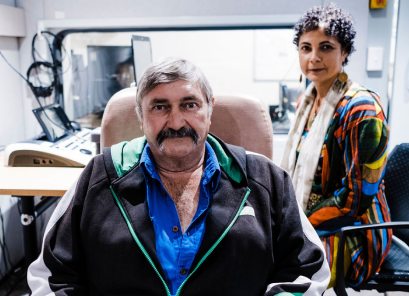“It’s a gift,” Peter King says, his eyes suddenly glassy with tears. “I’m just forever grateful.”
The burly bulldozer operator with a heart of gold has a cochlear implant he reckons saved his life.
It’s August 2008 and a heavy fall has left father of two Peter with severe head injuries and a right ear that shrieks relentlessly in protest. The tinnitus is unbearable. Doctors tell him there’s no way of silencing it.
“After all day on a bulldozer the tinnitus was that loud that I couldn’t hear in the other ear. It was really just screaming at me,” he recalls, shuddering. “You’d see people talking but you couldn’t hear them, you could just see their mouth moving.”
Peter’s last hope was audiologist Dayse Tavora-Vieira, head of audiology at Fiona Stanley Hospital and one of the many passionate professionals supported by the Spinnaker Health Research Foundation.
Dr Dayse Tavora-Vieira is leading the world in audiology research, particularly with the treatment of single-sided deafness using cochlear implantation. Dayse’s research has established Fiona Stanley Hospital as the global leader in hearing restoration treatment, with patient numbers the highest in the world for cochlear implants for single-sided deafness.
“She tried all kinds of different things,” Peter remembers with a warm chuckle. “God knows what she didn’t try — I seemed to be spending more time at her place than I did at my place!”
During one of those visits Peter noticed a picture of cochlear implant on the wall. “I just happened to mention one day ‘Would this help?’ And she said ‘Yes, I think so.’”
But the bad news: at that stage Germany was the only place in the world treating tinnitus with cochlear implants. But Dayse said, “Don’t panic.”
Then, about 12 months later Dr Tavora-Vieira called. “She said ‘There’s a pilot scheme, would you like to be a part of it.’ Well, I quit my job and said that’s it, I’m going to get it done no matter how long it takes.”
Peter received an implant in 2010. “They fixed me. Well, it’s not 100 per cent but my god, it makes life so much easier.”
Ask Peter what kind of difference Dr Tavora-Vieira’s groundbreaking work has made to his life and he’ll tell you straight. “It’s probably meant that I’m still alive because I’ll admit there were times that I was in a dark place. I honestly couldn’t continue to live the way I was.”
Peter and Dr Tavora-Vieira remain fast friends, bonded by a shared life-changing experience.
The celebrated audiologist, who was named Researcher of the Year in the inaugural South Metropolitan Health Service Excellence Awards, makes a point of getting to know her patients. Now Peter can’t imagine his life without her.
“She’s the second most important woman in my life.”
Life now is “chalk and cheese” compared with before, though it’s not without its challenges. But Peter is full of admiration for researchers like Dr Dayse Tavora-Vieira.
“I take my hat off to people that have a crack at doing something like this, it’s just awesome. When Dayse told me they’d given (a cochlear implant) to a child that had never heard before, I cried. I still get emotional over it. Just to help someone like that is brilliant,” he says, emotional again.
“They’ve just been so bloody good to me. There’s no other way you can say it.”
Investing in medical research is like stretching a safety net underneath the entire community.
Research isn’t only about improvements in diagnosis, treatment and care. It is about preventions that aim to keep you out of hospital and ensure your quality of life is underpinned by good health.”
Donate today to support research




